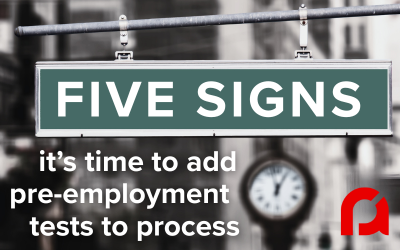Hiring decisions are generally a gamble, but some companies make them riskier than they need to be. Whatever stage your business is in, at some point, relying on gut instinct or a polished interview alone stops working. That’s where pre-employment assessments can add structure, objectivity, and consistency to your process.
But how do you know when it’s time to introduce assessments into your hiring workflow? Below are five clear signs that your process may benefit from a more data-driven approach.
Sign 1: You’re Making Too Many Bad Hires
Even one bad hire can cost thousands of dollars and months of productivity. That’s alarming when considering that an estimated 74% of employers have hired the wrong person for a role. Often, the candidate looked strong on paper or gave a great interview—only to underperform once they were on the job.
Pre-employment assessments help you evaluate meaningful, work-related characteristics like problem-solving ability, personality-job fit and work style before the hire is made. If you’ve been relying solely on resumes and interviews, and seeing disappointing results, this kind of additional insight may be overdue.
Sign 2: Interviews Aren’t Predicting Performance
Some people interview extremely well without bringing the same energy or effectiveness to their work. Others may not shine in a one-on-one interview but have excellent focus, reliability, or task-based strengths.
When strong interview performance doesn’t translate to strong job performance, it’s worth asking what’s missing. Pre-employment assessments offer a structured, consistent way to evaluate fit beyond verbal communication and self-presentation. They can help reinforce or clarify what an interview only hints at or perhaps misses entirely.
Sign 3: You’re Scaling Fast and Need Consistency
Hiring quickly can create inconsistency. With different managers making judgment calls across departments, it’s easy for your hiring standards to vary from role to role—or even from candidate to candidate.
Assessments bring consistency. When your team uses role-specific evaluations, you create a shared language and baseline for making decisions. A personality test designed for customer service roles, for instance, will highlight candidates who bring the patience, positivity, and reliability that the position demands. That kind of alignment helps ensure better outcomes, even as you scale.
Sign 4: Your Turnover Is Higher Than It Should Be
Turnover often reflects a deeper mismatch—between a person and the job, or between the individual and your workplace culture. Even skilled employees may leave quickly if the fit isn’t right.
Assessments help detect misalignment early. They can highlight whether someone is more autonomous or collaborative, structured or adaptable, resilient or easily upset. If you’re struggling to retain employees, assessments can offer predictive insights before you make the hire.
For more on this topic, see: Why Aren’t My Pre-Employment Tests Finding Good Hires?
Sign 5: You’re Guessing More Than You’d Like
Hiring often feels like guesswork, especially when candidates seem equally qualified or interviews raise more questions than answers. If your process lacks a clear, evidence-based method for comparing candidates, it’s easy to second-guess the outcome.
Pre-employment assessments give you a stronger foundation to work from. You’ll have measurable traits to evaluate, job-relevant data to consider, and insights that can guide your interview questions or onboarding process. This allows you to move forward with more confidence—and better results.
Final Thoughts
If any of these signs feel familiar, you’re not alone. Many organizations delay adding structure to their hiring process until the problems become unavoidable. But pre-employment assessments are no longer limited to large enterprises. Today, they’re accessible, flexible, and easy to incorporate into hiring at any stage of business growth.
Looking for more hiring insights? Browse the Resource Associates blog for practical strategies and research-based tips to help you build stronger teams.



